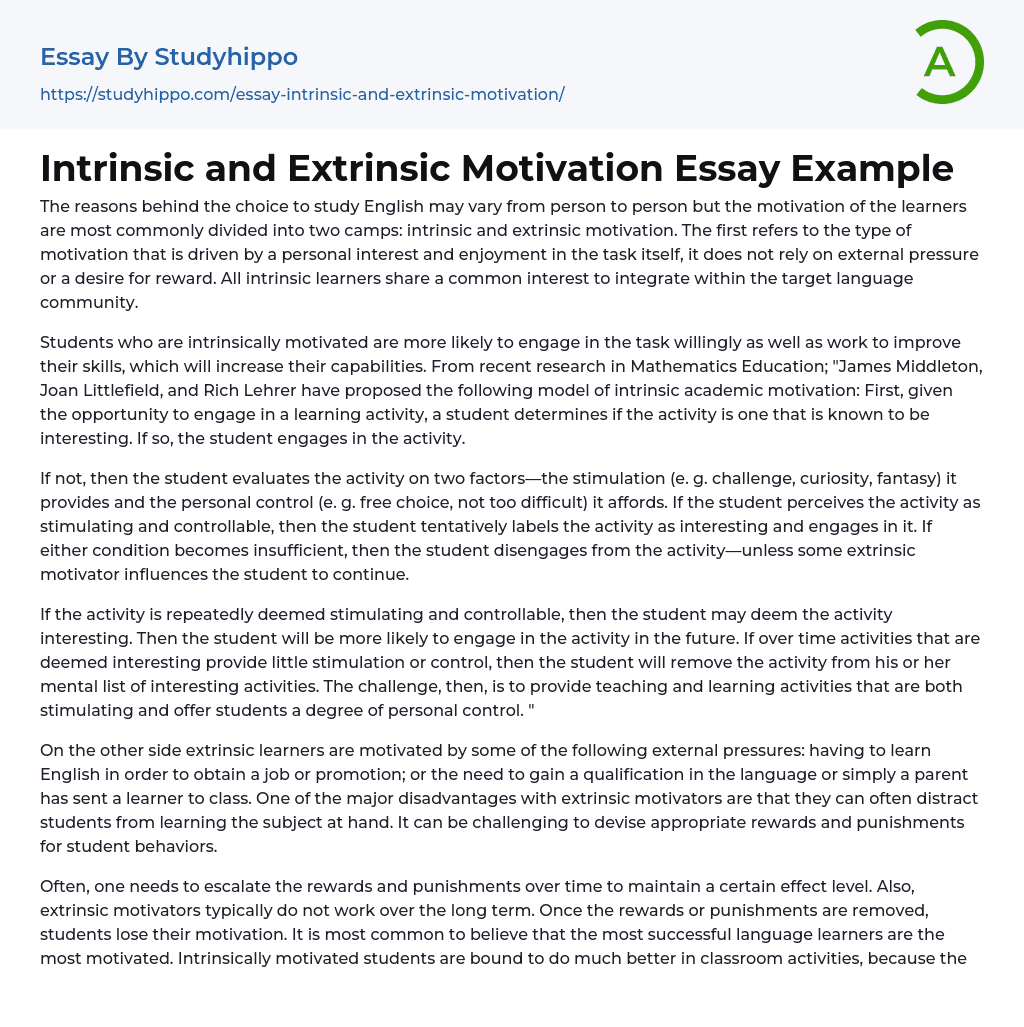People may have various reasons for learning English, but in general there are two types of motivation: intrinsic and extrinsic. Intrinsic motivation is driven by personal interest and enjoyment in the task, rather than external pressure or a desire for reward. Those who are intrinsically motivated aim to become part of the target language community.
According to recent research in Mathematics Education conducted by James Middleton, Joan Littlefield, and Rich Lehrer, students who have intrinsic motivation are more inclined to willingly engage in a task and work towards enhancing their skills. The researchers put forth a model of intrinsic academic motivation that highlights the significance of evaluating the level of interest linked to a learning activity prior to deciding whether or not to participate in it.
If the student does not find the activity stimulating and con
...trollable, they will disengage unless there is an external motivator. However, if the student perceives the activity as both stimulating and controllable, they will become interested and actively engage.
When an activity consistently gives students a sense of stimulation and control, they are more likely to be engaged. Conversely, activities that may initially seem interesting but lack stimulation or control will eventually lose their appeal to students. Therefore, it is crucial to create teaching and learning activities that offer both stimulation and a degree of personal control for students.
Extrinsic learners, in contrast to intrinsic learners, are motivated by external factors such as career advancement or job opportunities and the necessity of a language qualification. Occasionally, students may be enrolled in classes by their parents too. Nevertheless, one disadvantage of extrinsic motivators is
that they can distract students from the main focus of learning. Moreover, it can pose challenges in determining suitable rewards and penalties for student behaviors.
In order to sustain the desired impact, it is often necessary to progressively enhance rewards and punishments. However, once these external motivators are taken away, students tend to lose their motivation, leading to a lack of lasting influence. The common belief is that individuals who are highly motivated are the most successful language learners. Enthusiastic and eager learners who have intrinsic motivation show outstanding performance in classroom activities.
To gain a complete comprehension of a topic, students who are intrinsically motivated engage in a more profound learning encounter. Conversely, extrinsically motivated students may need incentives to accomplish the same tasks since they lack inherent inspiration to achieve their objectives. To adequately address my students' motivation and prior learning experiences, as well as identify the precise language skills they need to focus on and where they will utilize their English proficiency, I would first conduct a needs analysis. This analysis will empower me to choose and generate appropriate learning materials and exercises accordingly.
Frequent, early, and positive feedback that supports students' belief in their abilities can be a motivating factor. Assigning challenging but achievable tasks and helping students find personal meaning in the material are also effective strategies. Creating a familiar, open, and positive atmosphere is crucial, as is making students feel valued as members of a learning community.
After exploring various websites, I stumbled upon the Vanderbilt Center for Teaching website (http://cft. vanderbilt. edu). I highly recommend educators to consider fostering intrinsic motivation among extrinsic learners
by modifying their teaching approach to include the following themes: Make it authentic - design learning activities that revolve around subjects relevant to students' lives such as current events, popular culture, technology, sports, and celebrities. By doing so, the subject matter becomes relatable to students' everyday experiences.
Providing choices can boost student motivation by giving them a sense of independence in their learning. Conversely, if students feel they have no control over the structure of the class, their motivation may decrease. It is crucial to strike a balance in task difficulty. Students typically perform best when faced with challenges slightly beyond their current ability level. If tasks are too easy, students might become bored; whereas, tasks that are too difficult may seem unattainable and undermine their self-efficacy. One effective approach involves utilizing peer models whereby students can learn by observing their peers succeed at a given task.
Within this framework, a peer refers to an individual with whom the student can establish a connection. This association is not limited solely to other students; it encompasses diverse groups based on factors such as gender, ethnicity, social circles, interests, achievement level, clothing choices, or age. For example, contemporary students often admire sports and film celebrities. Consequently, educators should employ their resources and knowledge to encourage motivation and enthusiasm among students. Additionally, they should provide continuous assistance during the learning process in order for students to internalize the ultimate aim as their own.
- Reinforcement essays
- Archetype essays
- Maturity essays
- Deception essays
- Certainty essays
- Conformity essays
- Aggression essays
- Behavior essays
- Human Behavior essays
- Obedience essays
- Adult essays
- Procrastination essays
- Morality essays
- Altruism essays
- Human Sexuality essays
- Role Model essays
- Perseverance essays
- Expressive essays
- Character Traits essays
- Apology essays
- Compassion essays
- Interpretation essays
- Plagiarism essays
- Analogy essays
- Learning English essays
- Abnormal Psychology essays
- Abraham Maslow essays
- Attachment Theory essays
- Authority essays
- Behaviorism essays
- Classical Conditioning essays
- Cognitive Psychology essays
- Counseling essays
- Developmental Psychology essays
- Educational Psychology essays
- Erik Erikson essays
- Family Therapy essays
- Jean Piaget essays
- Maslow's Hierarchy Of Needs essays
- Mental Health essays
- Operant Conditioning essays
- Personality Psychology essays
- Positive Psychology essays
- Psychoanalysis essays
- Psychotherapy essays
- Sigmund Freud essays
- Social Psychology essays
- Stanford Prison Experiment essays
- Supersize Me essays
- Coaching essays




